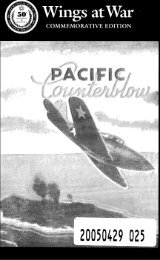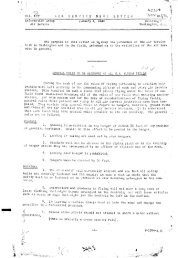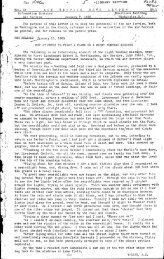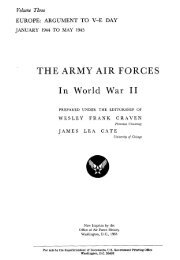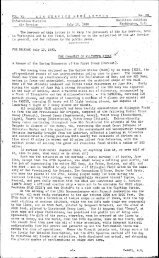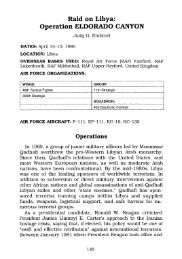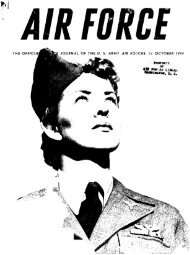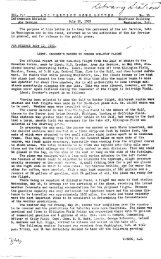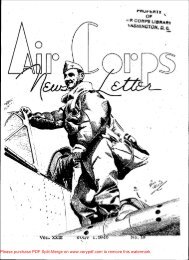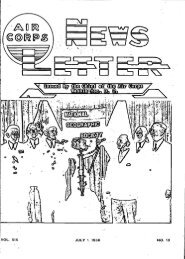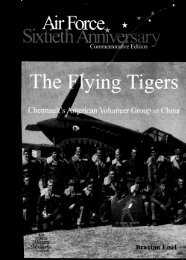- Page 1 and 2:
SPECIAL STUDIES Case Studies in the
- Page 3 and 4:
Foreword Writing in 1978, General W
- Page 5:
United States Air Force Historical
- Page 9 and 10:
Contents Foreword .................
- Page 11 and 12:
Savoia-Marchetti SM-79 ............
- Page 13:
EC-121 in flight over South Vietnam
- Page 16 and 17:
Offensive Against Germany, air supe
- Page 19 and 20:
1 Developments and Lessons before W
- Page 21 and 22:
LESSONS BEFORE WORLD WAR I1 Officer
- Page 23 and 24:
LESSONS BEFORE WORLD WAR I1 learned
- Page 25 and 26:
LESSONS BEFORE WORLD WAR I1 “supe
- Page 27 and 28:
LESSONS BEFORE WORLD WAR I1 1918. I
- Page 29 and 30:
LESSONS BEFORE WORLD WAR I1 objecti
- Page 31 and 32:
Left: Giulio Douhet: Below: Brig. G
- Page 33 and 34:
LESSONS BEFORE WORLD WAR I1 keeping
- Page 35 and 36:
TABLE 1-1 Comparative Squadron Stre
- Page 37 and 38:
LESSONS BEFORE WORLD WAR I1 of Loya
- Page 39 and 40:
LESSONS BEFORE WORLD WAR I1 for a F
- Page 41 and 42:
LESSONS BEFORE WORLD WAR I1 Formati
- Page 43 and 44:
LESSONS BEFORE WORLD WAR I1 availab
- Page 45 and 46:
LESSONS BEFORE WORLD WAR I1 and per
- Page 47 and 48:
LESSONS BEFORE WORLD WAR I1 Accordi
- Page 49 and 50:
LESSONS BEFORE WORLD WAR I1 arm cou
- Page 51 and 52:
LESSONS BEFORE WORLD WAR I1 to more
- Page 53 and 54:
LESSONS BEFORE WOR .D WAR The Heink
- Page 55 and 56:
LESSONS BEFORE WORLD WAR I1 suited
- Page 57 and 58:
The premier RAF fighters were the H
- Page 59 and 60:
LESSONS BEFORE WORLD WAR I1 four cr
- Page 61 and 62:
LESSONS BEFORE WORLD WAR I1 aviator
- Page 63 and 64:
LESSONS BEFORE WORLD WAR I1 strateg
- Page 65 and 66:
LESSONS BEFORE WORLD WAR I1 America
- Page 67 and 68:
LESSONS BEFORE WORLD WAR I1 Corps t
- Page 69 and 70:
LESSONS BEFORE WORLD WAR I1 homefro
- Page 71 and 72:
LESSONS BEFORE WORLD WAR I1 pursuit
- Page 73 and 74:
LESSONS BEFORE WORLD WAR I1 United
- Page 75 and 76:
LESSONS BEFORE WORLD WAR I1 Kenneth
- Page 77 and 78:
LESSONS BEFORE WORLD WAR I1 Employm
- Page 79 and 80:
LESSONS BEFORE WORLD WAR I1 1’Arm
- Page 81 and 82:
t LESSONS BEFORE WORLD WAR I1 Army
- Page 83 and 84: 2 The Luftwaffe Against Poland and
- Page 85 and 86: LUFTWAFFE AGAINST POLAND method whi
- Page 87 and 88: 4 .- . , Prominent Luftwaffe leader
- Page 89 and 90: LUFTWAFFE AGAINST POLAND influence
- Page 91 and 92: LUFTWAFFE AGAINST POLAND The twin-e
- Page 93 and 94: LUFTWAFFE AGAINST POLAND Czech airf
- Page 95 and 96: LUFTWAFFE AGAINST POLAND pilots mad
- Page 97 and 98: LUFTWAFFE AGAINST POLAND resistance
- Page 99 and 100: LUFTWAFFE AGAINST POLAND units, par
- Page 101 and 102: LUFTWAFFE AGAINST POLAND eight Batt
- Page 103 and 104: LUFTWAFFE AGAINST POLAND ture acros
- Page 105 and 106: LUFTWAFFE AGAINST POLAND The campai
- Page 107 and 108: LUFTWAFFE AGAINST POLAND tially cha
- Page 109 and 110: LUFTWAFFE AGAINST POLAND Battle of
- Page 111 and 112: LUFTWAFFE AGAINST POLAND Schmid’s
- Page 113 and 114: LUFTWAFFE AGAINST POLAND forces abl
- Page 115 and 116: LUFTWAFFE AGAINST POLAND fighters.
- Page 117 and 118: LUFTWAFFE AGAINST POLAND now concen
- Page 119 and 120: LUFTWAFFE AGAINST POLAND The Battle
- Page 121 and 122: LUFTWAFFE AGAINST POLAND TABLE 2-6
- Page 123 and 124: LUFTWAFFE AGAINST POLAND Notes 1. S
- Page 125 and 126: LUFTWAFFE AGAINST POLAND had no int
- Page 127 and 128: LUFTWAFFE AGAINST POLAND AFHRC: K 1
- Page 129 and 130: LUFTWAFFE AGAINST POLAND tary sourc
- Page 131 and 132: LUFTWAFFE AGAINST POLAND Deutschlan
- Page 133: 3 The Royal Air Force and the Battl
- Page 137 and 138: BATTLE OF BRITAIN cross-Channel att
- Page 139 and 140: FIGURE 3-1 Daily Fighter Command So
- Page 141 and 142: BATTLE OF BRITAIN because they were
- Page 143 and 144: BATTLE OF BRITAIN fully conversant
- Page 145 and 146: BATTLE OF BRITAIN assault against F
- Page 147 and 148: BATTLE OF BRITAIN a small force, wh
- Page 149 and 150: 131
- Page 151 and 152: BATTLE OF BRITAIN to so few.”I9 T
- Page 153 and 154: BATTLE OF BRITAIN too weak to fight
- Page 155 and 156: FIGURE 3-4 Production and Wastage o
- Page 157 and 158: BATTLE OF BRITAIN Spitfires of 610
- Page 159 and 160: BATTLE OF BRITAIN fighter’s prima
- Page 161 and 162: BATTLE OF BRITAIN mand, deal with t
- Page 163 and 164: FIGURE 3-5 RAF Manpower Ju139 Sept3
- Page 165 and 166: BATTLE OF BRITAIN May, 533 in June,
- Page 167 and 168: BATTLE OF BRITAIN Fighter Command s
- Page 169 and 170: BATTLE OF BRITAIN In the week endin
- Page 171 and 172: ~ ~~ BATTLE OF BRITAIN TABLE 3-1 RA
- Page 173 and 174: BATTLE OF BRITAIN national characte
- Page 175 and 176: BATTLE OF BRITAIN a run of less tha
- Page 177 and 178: BATTLE OF BRITAIN to work out a lim
- Page 179 and 180: BATTLE OF BRITAIN Me-109s over enem
- Page 181 and 182: BATTLE OF BRITAIN It was not as if
- Page 183 and 184: BATTLE OF BRITAIN canes would soon
- Page 185 and 186:
BATTLE OF BRITAIN up assuming no fi
- Page 187 and 188:
BATTLE OF BRITAIN fly, and thus the
- Page 189 and 190:
BATTLE OF BRITAIN example of the ty
- Page 191 and 192:
BATTLE OF BRITAIN 15. On gun develo
- Page 193 and 194:
BATTLE OF BRITAIN 67. Michael J. F.
- Page 195 and 196:
BATTLE OF BRITAIN Guide to the Sour
- Page 197 and 198:
4 The Soviet Air Force Against Germ
- Page 199 and 200:
SOVIET AIR FORCE Stalin’s forced
- Page 201 and 202:
SOVIET AIR FORCE and Stalin saw muc
- Page 203 and 204:
SOVIET AIR FORCE Oborony], or GKO,
- Page 205 and 206:
SOVIET AIR FORCE airfields were eit
- Page 207 and 208:
SOVIET AIR FORCE had some 2,500 pla
- Page 209 and 210:
I T 191
- Page 211 and 212:
SOVIET AIR FORCE Organizational Cha
- Page 213 and 214:
SOVIET AIR FORCE Development of Air
- Page 215 and 216:
SOVIET AIR FORCE experience that ga
- Page 217 and 218:
SOVIET AIR FORCE July 1942, and by
- Page 219 and 220:
SOVIET AIR FORCE excellence. Anothe
- Page 221 and 222:
SOVIET AIR FORCE live up to expecta
- Page 223 and 224:
SOVIET AIR FORCE Soviet radar, or R
- Page 225 and 226:
SOVIET AIR FORCE The VVS was not on
- Page 227 and 228:
SOVIET AIR FORCE Ya. Malinovsky, wa
- Page 229 and 230:
SOVIET AIR FORCE pocket in early 19
- Page 231 and 232:
SOVIET AIR FORCE acy over the Easte
- Page 233 and 234:
SOVIET Am FORCE VVS in the Initial
- Page 235 and 236:
SOVIET AIR FORCE 80. Russian Air Fo
- Page 237 and 238:
SOVIET AIR FORCE Commanders, Genera
- Page 239 and 240:
SOVIET AIR FORCE articles about bot
- Page 241 and 242:
5 Northwest Africa, 1942-1943 David
- Page 243 and 244:
NORTHWEST AFRICA The failure of the
- Page 245 and 246:
NORTHWEST AFRICA command, and contr
- Page 247 and 248:
NORTHWEST AFRICA land forces tangle
- Page 249 and 250:
NORTHWEST AFRICA trast, their oppon
- Page 251 and 252:
NORTHWEST AFRICA Command Crisis Eis
- Page 253 and 254:
NORTHWEST AFRICA ter. Portal agreed
- Page 255 and 256:
J B . ... d Lt. Gen. Carl Spaatz, C
- Page 257 and 258:
NORTHWEST AFRICA The Allied Air For
- Page 259 and 260:
I-’-i I I First Eighth Northwest
- Page 261 and 262:
NORTHWEST AFRICA about by sending u
- Page 263 and 264:
NORTHWEST AFRICA Allied Air Support
- Page 265 and 266:
NORTHWEST AFRICA doctrine for the e
- Page 267 and 268:
NORTHWEST AFRICA their fighter esco
- Page 269 and 270:
NORTHWEST AFRICA the weight of the
- Page 271 and 272:
NORTHWEST AFRICA to stop movement o
- Page 274 and 275:
AIR SUPERIORITY twenty-eight of the
- Page 276 and 277:
AIR SUPERIORITY sorties a day. By J
- Page 278 and 279:
AIR SUPERIORITY missing, while they
- Page 280 and 281:
AIR SUPERIORITY ance from the enemy
- Page 282 and 283:
AIR SUPERIORITY mander. The superio
- Page 284 and 285:
AIR SUPERIORITY Notes 1. AAF Histor
- Page 286 and 287:
AIR SUPERIORITY 52. Memo by Spaatz,
- Page 288 and 289:
AIR SUPERIORITY History Institute a
- Page 290 and 291:
Martin B-26 Marauder, resplendent i
- Page 292 and 293:
AIR SUPERIORITY advantage in any tr
- Page 294 and 295:
AIR SUPERIORITY FIGURE 6-1 Allied a
- Page 296 and 297:
AIR SUPERIORITY standards at the en
- Page 298 and 299:
AIR SUPERIORITY resistant to battle
- Page 300 and 301:
AIR SUPERIORITY More specifically,
- Page 302 and 303:
N 00 N POLAND GERMANY 0 Beauvais Wi
- Page 304 and 305:
AIR SUPERIORITY Republic’s hefty
- Page 306 and 307:
FIGURE 6-2 Allied Command Structure
- Page 308 and 309:
AIR SUPERIORITY FIGURE 6-3 Eighth A
- Page 310 and 311:
AIR SUPERIORITY difference in speed
- Page 312 and 313:
AIR SUPERIORITY The increased stren
- Page 314 and 315:
AIR SUPERIORITY bombs would probabl
- Page 316 and 317:
AIR SUPERIORITY efforts of the stra
- Page 318 and 319:
AIR SUPERIORITY At the time, it was
- Page 320 and 321:
AIR SUPERIORITY It was the responsi
- Page 322 and 323:
AIR SUPERIORITY Luftwaffe prior to
- Page 324 and 325:
AIR SUPERIORITY of enemy reinforcem
- Page 326 and 327:
AIR SUPERIORITY stocks of fuel and
- Page 328 and 329:
AIR SUPERIORITY b Top-ranking Ameri
- Page 330 and 331:
AIR SUPERIORITY at very short range
- Page 332 and 333:
AIR SUPERIORITY production. USSTAF
- Page 334 and 335:
AIR SUPERIORITY ized fighter-bomber
- Page 336 and 337:
AIR SUPERIORITY 16. USSBS, MAD, “
- Page 338 and 339:
AIR SUPERIORITY Box 135. Hughes, ho
- Page 340 and 341:
AIR SUPERIORITY Bibliographical Ess
- Page 342 and 343:
AIR SUPERIORITY ing because British
- Page 344 and 345:
AIR SUPERIORITY Planning for the Pa
- Page 346 and 347:
AUSTRALIA 326
- Page 348 and 349:
AIR SUPERIORITY to Japanese fighter
- Page 350 and 351:
AIR SUPERIORITY highly trained Japa
- Page 352 and 353:
AIR SUPERIORITY Guadalcanal in the
- Page 354 and 355:
AIR SUPERIORITY 20, escort carrier
- Page 356 and 357:
Above: Marines storm ashore in the
- Page 358 and 359:
AIR SUPERIORITY attacks against a s
- Page 360 and 361:
AIR SUPERIORITY fighters. American
- Page 362 and 363:
AIR SUPERIORITY During the fighting
- Page 364 and 365:
AIR SUPERIORITY tional Allied air f
- Page 366 and 367:
AIR SUPERIORITY launched no more da
- Page 368 and 369:
AIR SUPERIORITY the great Japanese
- Page 370 and 371:
W VI 0
- Page 372 and 373:
AIR SUPERIORITY part to play in the
- Page 374 and 375:
AIR SUPERIORITY sixty-seven B-25s c
- Page 376 and 377:
AIR SUPERIORITY had been at Pearl H
- Page 378 and 379:
358
- Page 380 and 381:
AIR SUPERIORITY The preinvasion ach
- Page 382 and 383:
AIR SUPERIORITY bringing reinforcem
- Page 384 and 385:
AIR SUPERIORITY er, a transport, an
- Page 386 and 387:
AIR SUPERIORITY achieved, and in de
- Page 388 and 389:
AIR SUPERIORITY Sooner or later in
- Page 390 and 391:
AIR SUPERIORITY ning of the Leyte c
- Page 392 and 393:
AIR SUPERIORITY Notes 1. Thomas H.
- Page 394 and 395:
AIR SUPERIORITY 29. Craven and Cate
- Page 396 and 397:
AIR SUPERIORITY 11: The War in the
- Page 398 and 399:
AIR SUPERIORITY are the History of
- Page 400 and 401:
AIR SUPERIORITY Carroll Dyer, The A
- Page 402 and 403:
AIR SUPERIORITY be pedestrian, and
- Page 404 and 405:
AIR SUPERIORITY ority over the stra
- Page 406 and 407:
AIR SUPERIORITY As for the views of
- Page 408 and 409:
I 388
- Page 410 and 411:
AIR SUPERIORITY January 10, 1942, t
- Page 412 and 413:
THE DOOLITTLE RAID, Above: One of C
- Page 414 and 415:
AIR SUPERIORITY enemy aircraft were
- Page 416 and 417:
AIR SUPERIORITY Japanese critics as
- Page 418 and 419:
Adm. Chester W. Nimitz, Commander i
- Page 420 and 421:
AIR SUPERIORITY The Japanese Homela
- Page 422 and 423:
AIR SUPERIORITY ordered to disperse
- Page 424 and 425:
AIR SUPERIORITY more modest report
- Page 426 and 427:
AIR SUPERIORITY enemy’s defense s
- Page 428 and 429:
AIR SUPERIORITY in the spring of 19
- Page 430 and 431:
AIR SUPERIORITY With the intensific
- Page 432 and 433:
AIR SUPERIORITY time. This inabilit
- Page 434 and 435:
AIR SUPERIORITY the 10th Air Divisi
- Page 436 and 437:
AIR SUPERIORITY invasion, they reli
- Page 438 and 439:
AIR SUPERIORITY over the Ryukyus wi
- Page 440 and 441:
420
- Page 442 and 443:
AIR SUPERIORITY 10, at a cost of on
- Page 444 and 445:
AIR SUPERIORITY On the morning of A
- Page 446 and 447:
AIR SUPERIORITY that day; 3 Mustang
- Page 448 and 449:
AIR SUPERIORITY above them and lost
- Page 450 and 451:
AIR SUPERIORITY Force was finally a
- Page 452 and 453:
AIR SUPERIORITY Hellcats, Corsairs,
- Page 454 and 455:
AIR SUPERIORITY Ariake Bay, and Kus
- Page 456 and 457:
AIR SUPERIORITY drawal of aircraft
- Page 458 and 459:
AIR SUPERIORITY Conclusions This ch
- Page 460 and 461:
AIR SUPERIORITY Allied air power. T
- Page 462 and 463:
AIR SUPERIORITY In achieving de fuc
- Page 464 and 465:
AIR SUPERIORITY strategic alternati
- Page 466 and 467:
AIR SUPERIORITY 67. USSBS, Japanese
- Page 468 and 469:
AIR SUPERIORITY 125. “G-2 Estimat
- Page 470 and 471:
AIR SUPERIORITY (Washington, DC, 19
- Page 472 and 473:
AIR SUPERIORITY While carrying out
- Page 474 and 475:
AIR SUPERIORITY North Korea and the
- Page 476 and 477:
456
- Page 478 and 479:
458
- Page 480 and 481:
AIR SUPERIORITY TABLE 9-1 FEAF Orga
- Page 482 and 483:
AIR SUPERIORITY ‘ r on July 20, N
- Page 484 and 485:
AIR SUPERIORITY the carriers’ Com
- Page 486 and 487:
AIR SUPERIORITY from Sinuiju to Cho
- Page 488 and 489:
AIR SUPERIORITY cruised at very dif
- Page 490 and 491:
AIR SUPERIORITY the bullets fired a
- Page 492 and 493:
AIR SUPERIORITY vailed among the le
- Page 494 and 495:
AIR SUPERIORITY The Fourth FI Wing
- Page 496 and 497:
AIR SUPERIORITY F9F-2 Panther jets
- Page 498 and 499:
AIR SUPERIORITY across North Korea
- Page 500 and 501:
AIR SUPERIORITY the clouds by day a
- Page 502 and 503:
AIR SUPERIORITY obtain a bearing on
- Page 504 and 505:
AIR SUPERIORITY ing the B-29s durin
- Page 506 and 507:
AIR SUPERIORITY (See Table 9-9) The
- Page 508 and 509:
AIR SUPERIORITY General Weyland, FE
- Page 510 and 511:
AIR SUPERIORITY teristics, high-spe
- Page 512 and 513:
AIR SUPERIORITY had drastically imp
- Page 514 and 515:
AIR SUPERIORITY Chinese and North K
- Page 516 and 517:
AIR SUPERIORITY mented their streng
- Page 518 and 519:
AIR SUPERIORITY opponents operating
- Page 520 and 521:
AIR SUPERIORITY 25. Gen G. E. Strat
- Page 522 and 523:
AIR SUPERIORITY Fighter Weapons Rev
- Page 524 and 525:
AIR SUPERIORITY weights Over Korea:
- Page 526 and 527:
AIR SUPERIORITY then governed aircr
- Page 528 and 529:
AIR SUPERIORITY kinds of targets in
- Page 530 and 531:
AIR SUPERIORITY The F-105 Thunderch
- Page 532 and 533:
AIR SUPERIORITY On March 31, 1968,
- Page 534 and 535:
AIR SUPERIORITY I I I I CINCPACFLT
- Page 536 and 537:
CHINA / LAOS THAILAND - North Vietn
- Page 538 and 539:
AIR SUPERIORITY winds were from the
- Page 540 and 541:
AIR SUPERIORITY forces. To facilita
- Page 542 and 543:
TABLE 10-3 Aircraft Assigned to Sou
- Page 544 and 545:
~ ~ ~ TABLE 10-5 Major USAF Bases i
- Page 546 and 547:
AIR SUPERIORITY never threatened U.
- Page 548:
AIR SUPERIORITY never need to engag
- Page 551 and 552:
SOUTHEAST ASIA The SA-2, however, w
- Page 553 and 554:
SOUTHEAST ASIA jamming static with
- Page 555 and 556:
Above: Aerial view of the Monkey Mo
- Page 557 and 558:
SOUTHEAST ASIA In April, the Presid
- Page 559 and 560:
SOUTHEAST ASIA MiG-21s tried a new
- Page 561 and 562:
SOUTHEAST ASIA aircraft guns, NVAF
- Page 563 and 564:
SOUTHEAST ASIA system.80 This probl
- Page 565 and 566:
SOUTHEAST ASIA later, in the 1972 L
- Page 567 and 568:
SOUTHEAST ASIA Air Force Base, Guam
- Page 569 and 570:
SOUTHEAST ASIA At the beginning of
- Page 571 and 572:
SOUTHEAST ASIA F-4 Phantom refuelin
- Page 573 and 574:
SOUTHEAST ASIA Conclusion U.S. forc
- Page 575 and 576:
SOUTHEAST ASIA however, were not re
- Page 577 and 578:
SOUTHEAST ASIA Notes I . The Pentag
- Page 579 and 580:
SOUTHEAST ASIA 72. Futrell, Aces an
- Page 581 and 582:
SOUTHEAST ASIA by Col. Delberth Cor
- Page 583 and 584:
11 The Israeli Experience Brereton
- Page 585 and 586:
THE ISRAELI EXPERIENCE Geo-Strategi
- Page 587 and 588:
THE ISRAELI EXPERIENCE during the w
- Page 589 and 590:
THE ISRAELI EXPERIENCE “fluid pai
- Page 591 and 592:
THE ISRAELI EXPERIENCE The 16 C-47
- Page 593 and 594:
THE ISRAELI EXPERIENCE destruction
- Page 595 and 596:
THE ISRAELI EXPERIENCE The principl
- Page 597 and 598:
THE ISRAELI EXPERIENCE air operatio
- Page 599 and 600:
THE ISRAELI EXPERIENCE installation
- Page 601 and 602:
THE ISRAELI EXPERIENCE it was proba
- Page 603 and 604:
THE ISRAELI EXPERIENCE oil embargo
- Page 605 and 606:
THE ISRAELI EXPERIENCE been a failu
- Page 607 and 608:
THE ISRAELI EXPERIENCE An Israeli A
- Page 609 and 610:
THE ISRAELI EXPERIENCE Very early o
- Page 611 and 612:
THE ISRAELI EXPERIENCE when the Sky
- Page 613 and 614:
THE ISRAELI EXPERIENCE Consequently
- Page 615 and 616:
THE ISRAELI EXPERIENCE ities and fi
- Page 617 and 618:
THE ISRAELI EXPERIENCE In the last
- Page 619 and 620:
THE ISRAELI EXPERIENCE usual speed.
- Page 621 and 622:
THE ISRAELI EXPERIENCE and one Phan
- Page 623 and 624:
THE ISRAELI EXPERIENCE 38. Trevor D
- Page 625 and 626:
THE ISRAELI EXPERIENCE 133. Dupuy,
- Page 627 and 628:
THE ISRAELI EXPERIENCE King Hussein
- Page 629 and 630:
12 Some Concluding Insights I. B. H
- Page 631 and 632:
CONCLUSION the problems of tomorrow
- Page 633 and 634:
CONCLUSION commander must avoid dis
- Page 635 and 636:
CONCLUSION principle of concentrati
- Page 637 and 638:
diversity in spare parts. Unless Ai
- Page 639 and 640:
CONCLUSION with the enemy. Given th
- Page 641 and 642:
CONCLUSION to make the best possibl
- Page 643 and 644:
CONCLUSION that a major responsibil
- Page 645 and 646:
CONCLUSION the most promising, albe
- Page 647 and 648:
Contributors LEONARD BAKER was a jo
- Page 649 and 650:
CONTRIBUTORS Out of the Shadows: Ca
- Page 651 and 652:
CONTRIBUTORS Theater, 1944-45 ,”
- Page 653 and 654:
Index ABDA (American-British- Dutch
- Page 655 and 656:
INDEX 11-28: 523 MiG-15: 525, 546 M
- Page 657 and 658:
INDEX priorities of: 227 weekly cas
- Page 659 and 660:
INDEX 401 -402 effectiveness of, No
- Page 661 and 662:
INDEX Black Sunday, for Allied bomb
- Page 663 and 664:
INDEX Coastwatchers in New Guinea:
- Page 665 and 666:
INDEX commander, Eighth Air Force:
- Page 667 and 668:
INDEX Fall Weiss: 74 Falmouth. Engl
- Page 669 and 670:
INDEX defeat of, imminent: 257 defe
- Page 671 and 672:
~ INDEX USMC squadrons in: 546 Head
- Page 673 and 674:
INDEX 308-313 in Southeast Asia: 62
- Page 675 and 676:
INDEX Japan: 386 Kenley. England, a
- Page 677 and 678:
INDEX in Battle of Britain: 100, 12
- Page 679 and 680:
INDEX created: 246 strength of: 256
- Page 681 and 682:
INDEX Nile River Israeli air attack
- Page 683 and 684:
INDEX 505-506, 554 air superiority
- Page 685 and 686:
INDEX attacks on: 460, 484 capital:
- Page 687 and 688:
INDEX Royal Auxiliary Air Force, fo
- Page 689 and 690:
INDEX Warfare: 180 Solomon Islands.
- Page 691 and 692:
INDEX Sugawara, Michio, commander,
- Page 693 and 694:
INDEX role of: 165-166 Union of Sov
- Page 695 and 696:
INDEX See also Air superiority. air
- Page 697 and 698:
INDEX 395, 408 Western Desert Air F




